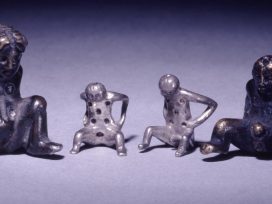Vita Matiss: The current controversy surrounding the three Baltic presidents’ differing responses to the invitation to attend the 9 May World War II anniversary ceremonies in Moscow has once again brought to the fore the issue of the parallels between Nazism and communism. The issue of the similarity between these two totalitarian regimes is not a new one. In Latvia, however, there has been a certain tendency to condemn both regimes as equally despicable in the international arena. In your book, Memoire du mal. Tentation du bien , you show that there have been many trailblazers on this issue, often at great cost to themselves.
You place the question of the parallels between Nazism and communism within a specific European post-World War II historical and philosophical context. As you point out, this context was not at all favourable for people like Margarete Buber-Neumann and David Rousset. Is the context for raising the issue of the similarities between these totalitarian regimes significantly more propitious today?
Tzvetan Todorov: Vast question… First of all, a comparison of the two totalitarian regimes is not something new. On the eve of the Second World War, when the first democratic and liberal criticisms of the two regimes emerged in both Europe and the United States, it had even become rather common – just about everywhere, those who observed the rise of these two totalitarian regimes were susceptible to their similarities. This similarity attained its apogee in September 1939, when, after the German-Soviet pact, that is, Nazi-Communist pact, both totalitarian leaders embarked upon a common political path, when Hitler and Stalin simultaneously invaded Poland. At this moment, it was clear for everyone that the two regimes not only resembled each other, but that they were accomplices.
What made the comparison difficult was the Second World War. It’s due to the fact that Germany declared war on the Soviet Union that the Soviet Union found itself lined up on the same side as the liberal democracies – Great Britain and the United States. And after the war, the burden that had been shouldered by the Soviet Union in the battle for the defeat of Nazism was such, that one had difficulty in continuing to affirm the connection between the two totalitarian regimes. But from this time on, starting with let’s say 1948 to 1949, and increasingly in the following years, not only the comparison, but the proof, the demonstration of the proximity of the two regimes was made evident. Margerete Buber-Neumann, who is such an eloquent example of this connection – as soon as she was let out of the Soviet camps she was handed over to the Nazi jailers so that she could spend the next five years in Ravensbruck. And the case was also made through the writings of Raymond Aron in France, Conquest in the United States, of other historians and political scientists who insisted on the link.
Are we in a better situation today? Has this smokescreen, this veil that prevented one from clearly seeing the nature of the Soviet regime, and which was due to the German-Soviet conflict, to the conflict between Nazis and Communists, been lifted? I would say that in eastern Europe – probably yes, but that in western Europe – no. This is the big difference between the two Europes. I’m not speaking here of “Old Europe” and “New Europe” like Donald Rumsfeld, because for me all of Europe is old. These are countries that all live with a millenial history, unlike other countries made up of recent immigrants and therefore essentially united by a future project, rather than by a common past. This difference persists because western Europeans have never had to suffer the domination of a communist regime. On the contrary, they had to suffer the domination of the Nazis, as the Nazis occupied most all of Europe. The Communists of that time fought side by side with Democrats of every stripe, in France the Communists fought side by side with the Gaullists to liberate the country, and thus they subjected their ideological battle to the patriotic battle. You cannot say to Frenchmen today that the French Communists were like the Nazis. In the West, it is very difficult to explain this connection, which for us, natives of the eastern European countries – and in this respect, even though I’ve lived longer in France than in Bulgaria, here I react with the sensibility of a Bulgarian – is self-evident.
Now we are united together in Europe, it is crucial that eastern Europeans finally be heard out by western Europeans. To take a personal example: I find it profoundly troubling to be riding around the suburbs of Paris and to pass from Lenin Boulevard to Avenue Dzherzinski. It seems to me that now we are reunited in one and the same political ensemble – the European Union – in the name of ideals which are democratic ideals as opposed to totalitarian principles, the moment has come to share with western Europeans the experience of eastern Europeans.
Just to complicate things, I would like to mention another example from another part of the world where the date of 9 May – or 8 May depending on the country – takes on a significance which is almost diametrically opposed according to the different participants. I’m speaking of Algeria – which at the time was part of the French Republic, which was not a colony but truly a continuation of French territory. Many Algerians participated in the battle for the liberation of France, they were part of the Army, they were conscripted into the Army, and on 9 May 1945, these Algerians decide to demonstrate to demand that this liberation extend itself also to Algeria vis-à-vis France. This demonstration gets off track, it degenerates, one hundred or more Frenchmen are killed. In retaliation against those who led the demonstration, the French kill 15 000 to 20 000 Algerians. Today, 9 May 1945 is considered to be the beginning of the war of Algeria against France. Can Algerians celebrate the 9th of May or should it be a date that they regret? It’s not the same question as for the eastern Europeans, as for them the end of the war consecrated a new division of the world. So one can’t respond in one phrase. My personal position would be that the end of World War II deserves to be commemorated. I very much believe that the European Union is the best political event to come about on our continent for some time, as it is an agreement that renders war impossible. We can have our quarrels, we can be in disagreement with each other, but we know that Latvians will never again wage war against Lithuanians, nor against Poles, nor against Estonians.
VM: Between themselves that is – what lies beyond their external borders is another issue entirely.
TT: Of course. Today there are 25 countries who for centuries, if not millenniums, waged war on each other constantly; now war between them has become impossible. I find that this is a marvelous achievement. This achievement was possible thanks to the fact that the Nazi regime was defeated, as this regime had conquered all of Europe including the Baltic countries, and it is in the name of the victory over that which this regime incarnated that the peace in Europe was made possible. The fact of the Soviet occupation of eastern Europe delayed by 40 to 45 years the entry of these countries into an era of liberty, but in the end, these countries also benefited from the victory over Nazi Germany. If the two dictators had been sufficiently intelligent in 1940 to agree among themselves over the division of the world, we would all still be inhabitants of totalitarian countries.
VM: Perhaps it is just by chance that I happen to be in France at a time when you are celebrating the 100th anniversary of the birth of both Sartre and Aron. The French newspapers seem to be full of articles on the two men accompanied by a certain communist-style sama-kritika – yes, Sartre was wrong on communism and Aron was right after all, despite the fact that we all vilified Aron at the time and adored Sartre. Just reading a few articles, there seems to be even a bit of competition going on among the chattering classes about who was the most principled anti-totalitarian at the time. Jean Daniel a few days ago writes in his polemic with Jean-Louis Bourlanges that: ” Dans un pays comme la France, ou l’hegemonie intellectuelle du stalinisme a fait plus de ravages qu’ailleurs, il y aura eu deux grandes references: une a gauche, celle de Camus et une a droite, celle de Raymond Aron “. Do you agree with Daniel that in France ” l’hegemonie intellectuelle du stalinisme a fait plus de ravages qu’ailleurs “, and are you of the opinion that the current French sama-kritika is not just, as in the communist fashion, a pro-forma one, but that there is a substantive change of opinion going on?
TT: I think that the changes came about some time ago. The change took place towards the end of the 1970s and early 1980s, when Raymond Aron, who up until then had been a vilified figure of the enemy – rejected and scorned – became the respected thinker. One realized that Raymond Aron’s lucidity and moderation allowed him to be the best observer of his century. When Daniel says that the left was Camus, and the right – Aron, I don’t recognize myself in this formula. In any case, they are two intellectuals despite the fact that one is a great writer and the other a great scholar – historian and sociologist – two intellectuals who had the merit, effectively, of being anti-totalitarian, which raises the prestige of France a bit, as not everybody was under the grip of the Captive Mind, as Milosz would say. So we can take pride in the fact that there were people like Aron and Camus. I don’t think that this self-criticism is hypocritical either at the political or the intellectual level. I think that truly, today the common opinion is anti-totalitarian. The change took place some time ago.
VM: In your answer to my first question, you said that the self-criticism was sincere, that it wasn’t a formal admission. But if the self-criticism is sincere – if politicians and the general populace in France admit that they were mistaken about communism during the 1950s, and at the end of the 1940s, then that doesn’t square with what you said earlier, that the context in western Europe today is such that…
TT: No, they weren’t mistaken, because here one needs to insert a nuance. The Communist Party was a very popular party in France; and I think that Daniel was right in saying that Stalinism wreaked greater havoc in France than anywhere else in the West. When I arrived in France, the Communist Party received 20 per cent of the popular vote. On the left, nothing could happen without the Communist Party. You can imagine how perplexing that was for someone like me, coming from Bulgaria. It was also a party – unlike the Italian Communist Party, which was also very important – that was not a reformist party. But to return to your question: what the general public thinks today concerns the Soviet Union, not the idea of communism. The idea of communism, unfortunately, is not definitively compromised.
VM: They don’t equate the Soviet Union with the idea of communism?
TT: No, because in France there is always the Communist Party. But there are also three or four Trotskyist parties which are more communist than the Communist Party. But they are anti-Stalin, anti-Soviet, because as you know Trotsky criticized Stalin and so on… But in the presidential elections in 2004, the social-democratic candidate was torpedoed by the extreme leftwing, which took 10 per cent of the vote. This means that in France 10 per cent of the population – and that’s not insignificant – dreams of an ideal communist society.
VM: Today, in Latvia and elsewhere, almost everyone automatically makes the link between the communist ideology and the Soviet Union.
TT: In the Balkans, in the Czech Republic, for all of eastern Europe the equivalence is evident. But for the French the equivalence is not evident because they had their own Communists, people who fought against the Nazis, people who also fought for better wages, people who, like the Christians, were ready to sacrifice themselves to assist the poor, to help their brethren…
VM: In addition, there were so many Communists active in the Resistance…
TT: In the Resistance, but even after the Resistance. I remember when I arrived in France in the 1960s, the Communists were the only ones who were ready to go from house to house, to do the shopping for an old lady who didn’t have a car, to help an old handicapped man and so on. They did what Christians do, as a rule. They were moved by a feeling of common solidarity which did not exist for the representatives of the parties that were called “bourgeois”. People from eastern Europe also need to understand that people in the West don’t have the same experience of the communist idea. But regarding the Soviet Union, I don’t think that there is anyone anymore who has any illusions concerning what it was.
VM: If you asked the man on the street, say in Latvia – first of all he would be surprised why you make the difference between the communist ideology and the Soviet Union. But if you ask him which of these two things still has credibility in the West, he would probably reply that in the West, people probably think that the Soviet Union was a good thing, because it played such a large role in defeating the Nazis. But communism – who could have any illusions about communism?
TT: Every human being reflects out of his own experience. In the years immediately following the war, the French, the Dutch, and the British were aware of the sacrifice of millions of Soviets in order to bring the war to its victorious end. But today, one thinks that it was the Americans that won the Second World War. When the sixtieth anniversary celebrations of the Normandy landing were held in June 2004, there were hardly any Russian representatives. But the war was almost over in June 1944, it was eleven months before its definitive end, the Russians had already won the war. Because you know, one likes to spruce up the past when it serves your purposes.
VM: In your book, you quote the Bulgarian dissident, former president Jelev, as saying that “before you can turn the page, you need to read it”. Am I correct in surmising that basically you agree with him, but that your concern is mainly about the meaning we extract from the page before we turn it?
TT: Absolutely. Very often in France – and elsewhere in Europe – one says that memory is sacred, that one must never forget. “Never forget” – it’s a slogan that we hear all the more frequently for we live in countries where things change very quickly. As a result we say to ourselves even more strongly “preserve the past”, “always remember”, “the duty to remember”.
VM: There is the much-quoted saying of Santayana: “Those who forget the past are condemned to repeat it.”
TT: Exactly. If one reflects on this issue, one realizes that the past as such, in itself, contains no lessons. One can draw any and every lesson one wants from the past. I mention this example because it is extreme: Hitler saying that the Armenian genocide was a good thing, “as the Turkish generals got away with it without the slightest punishment”. The memory of the Armenian genocide in itself didn’t prevent genocide; on the contrary, it can even give ideas to certain people. What are the lessons of the Second World War? Of course, they do not ensue from the facts themselves. Meaning is a thing we give to events, the way that we integrate the events into a larger context, the questions that we address to these events, the values that we attach to them – that’s how we can judge them. In 1945, the Resistance was a movement about which one had to have a 100 per cent positive view. Fifty or sixty years later, one begins to distinguish between different forces in the Resistance, different intentions, different justifications. One delivers more nuanced judgements.
VM: In Latvia, there was a certain mania for reconstituting history. A perfectly understandable reaction given the fact that Latvians had lost their history, that facts had been grossly manipulated and so on. Commission after commission was created for researchers to finally establish if there were really 5 312 deportees or 4 891 deportees at such and such a moment. I believe that the establishment of such facts is an important task. I wrote an article in the Latvian press in which I cited one of your works and asked how the establishment of these facts will prevent them from recurring. At the time, the remark was not much appreciated.
TT: In my book, I establish a difference between three stages. Of course this is a theoretical distinction, as in practise you can do all three stages at the same time. The three stages are, firstly, the establishment of the facts, which is the base from which one must start. One must know how many people were killed in the Katyn forest. And you need to know who fired the shots. Was it the Nazis or the Chekists? That’s only the first stage. The second stage is the interpretation that one gives the facts. To understand who, what, and why. The third stage is the use one makes of this interpretation. The interpretation is not contained in the facts themselves. And even the use is not entirely contained in the previous stages. It’s not for historians to decide how to use the knowledge, it’s for your president to decide. General de Gaulle said – the candour is amazing: “France doesn’t need to look too closely at who did what during the Second World War, France needs to assert her thousand year continuity…” As a politician, perhaps he was right. But coming from the mouth of a historian, such words would be profoundly scandalous.
VM: But imagine if a politician uttered such words today…
TT: In morality we like to say that the obligation does not ensue from being. That moral obligation, the will, is not dictated by facts themselves. That there is not one political course that is dictated by the facts themselves. This was the presupposition of Marxism. We are not Marxists because we refuse this sort of rigid determinism, which establishes that from the moment that you have analyzed a situation of class struggle, capitalism, and so on, that there is only one solution possible. Even the best analysis doesn’t dictate the action to be undertaken. One can determine how many people were deported, but this doesn’t tell us how we can use this knowledge to see that no one ever gets deported again.
VM: To return to Jelev’s quote: the page that Latvian politicians would like Russia – and not only Russia – to read, is the affirmation that Stalin and Hitler are both to be condemned for agreeing to the Molotov-Ribbentrop pact and its secret protocols, that the three Baltic countries were occupied against their will by the Soviet Union. Russia does not seem to be able to understand this. Should the Baltic countries turn the page anyway?
TT: I would say so. Because if we wait to resolve all of the quarrels of the past we will never see peace. I remember that the Israelis and the Palestinians were gathered at one of these attempts at arbitration, where people of good will from both sides meet to discuss how to end the conflict. They arrived at the conclusion that article 1 of their treaty would state that neither side would attempt to agree on an interpretation of the past. And to go back further, to the Edict of Nantes, which at the end of the sixteenth century put an end to the religious wars that were tearing Europe apart, wars just as violent and cruel any of the twentieth century. Article 1 of the Edict of Nantes states that evoking the division and wars is punishable. Evoking the past is even outlawed. I wouldn’t go so far as to demand that. But I think that one shouldn’t make a sine qua non of it.
VM: I understand your argument, but let’s take the example of France and Germany. Do you think it would have been possible for France and Germany to start a new chapter after the war if Germany had not admitted that France had been occupied in 1940?
TT: No. But Germany was a defeated country, and the victors dictated the conditions of Germany’s behaviour. Russia was not a defeated country. Not having been defeated militarily, not having been obliged to accept conditions, the Latvians, Lithuanians, and Estonians were now able to dictate the politics of the Russian state. Whereas it was the French, the British, the Americans, and the Russians who dictated the politics of Germany. For five years, Germany had no politics of its own, Germany was simply managed by its conquerors. So one should not be surprised by this difference.
VM: Perhaps another difference between Germany in 1945 and Russia today lies in the fact that Germany, having lost the war, and having suffered the dictate of the allies, nonetheless wanted a reconciliation. Does Russia really want a reconciliation today? I don’t have an answer to this question. I just think that there has to be a will on both sides.
TT: Certainly. But Germany desired to become part of a greater entity, which in the beginning was the Europe of Six, the Common Market. Russia is not a candidate for membership in the European Union. So we can’t demand that the Russians submit themselves to our conditions. We can look to influence them, and I believe that we are doing that. We should insist on democratic institutions from them, we should give them our assistance. But one mustn’t dream – world politics is not a game of morals. One doesn’t conduct politics with moral lessons. Politics is a rapport de forces .
VM: Moreover, it is exactly in these terms that the Ministry of Foreign Affairs of Russia reproaches the Baltic countries: “We don’t need any moral lessons.”
TT: But effectively, politics is not a matter of morals. The American government proves that to us every day, the French government too… Politics is not morality – one must get rid of this illusion.
VM: In your book, you draw some interesting parallels between Nazism and communism, but also point out ways in which they differed. Contrary to popular assumption, you postulate that compared to Nazism, the gap between ” le discours et le monde ” is larger under communism than under Nazism. That after the death of Stalin one no longer tried to bridge the gap, but instead to hide it. ” Le regime sovietique est beaucoup plus mensonger, illusoire, theatral que le regime nazi .” Another difference that you indicate is that the islands of Kolyma and the Solovki were the Russian equivalents of Buchenwald and Dachau, but that there was never the equivalent of Treblinka in the Soviet Union. In your opinion, does the fact that the Soviet Union never had camps exclusively devoted to quick, industrialized assasination justify the continued affirmation that the Soviet variant – death in 3 months by starvation, exhaustion, and cold – was not intended to eliminate entire groups of people?
TT: No, I don’t think so. There were the equivalents of Treblinka in the Soviet Union, but they didn’t take the form of camps. At a certain moment, the Soviet government gave the order to do away with entire sectors of the population. The Katyn forest is a significant example of this. One takes 15 000 people or 20 000 people, and one kills them all together in one night – better than Treblinka, if I dare say so. But that wasn’t the function of the camps. The Soviet camps were slave labour camps, where it has been decided that human life has no value. One doesn’t give the prisoners anything to eat, because if they die, they can be replaced. In this sense, deciding they will die or being indifferent to their death – for me, this is a difference that doesn’t excuse anything. It doesn’t diminish the crime. Therefore, it is just as serious. But one must note that the mortality rate, even in the worst Soviet camps – let’s say Kolyma or Magaban or Norilsk – was never 90 per cent. Even in those conditions. A human being is very resistant, he adapts, he survives with a meager soup. It is lamentable, the length and the expectancy of life was shortened, but all the same not everybody died in the space of three months. Everybody at Treblinka died in three days.
VM: Of communism, in your book you write that ” dans l’optique du présent, sa condamnation est également d’une plus grande actualité; la mystification qu’il opère est plus puissante, plus séduisante, le démasquer est plus urgent “. (p. 134). On the other hand, in the last chapter of your book you affirm that ” le traumatisme infligé par l’expérience totalitaire aux peuples européens a été, me semble-t-il, trop profond, les dégâts causés trop lourds, pur qu’on puisse imaginer que les doctrines totalitaires recouvrent leur séduction dans un avenir proche “. Isn’t there a certain contradiction between these two affirmations? In the Baltic countries, many people would say that the reason that the condemnation of communism is such a pertinent matter is precisely because the seduction of totalitarianism today in Russia is present.
TT: (chuckles…) I was talking about the European world, and not about Russia. But it is clear that in Russia the fall of communism was accompanied by a weakening of the nation, of the power of the nation. And for this reason, nationalism can keep up an illusory hope, a nostalgia for communism. In Russia, communism is less dead than anywhere else. But in Europe we don’t have this problem – our period is not mixed up with the period when we were subjected to communism. In eastern European countries, we were slaves. I think that today it is a much more important task to acquire a sense of lucidity about the communist ideology than about Nazism. Because apart from a few cranks in Germany and other countries, nobody extols the Nazi ideology anymore. Whereas the communist ideology continues to be extolled by significant minorities. In France, in the Third World. Therefore it is important to recall that this ideology, which at a certain level of generality can be seductive – it will bring us all fraternity, a glorious, radiant future –, is a deadly one. It is important to call to mind that nothing good can come from this ideology. It seems to me that this is truly a necessary lesson. Latvians are well inoculated against the temptation of communism, but it must be propagated everywhere. That is their duty.
Paris, 14 March 2005






